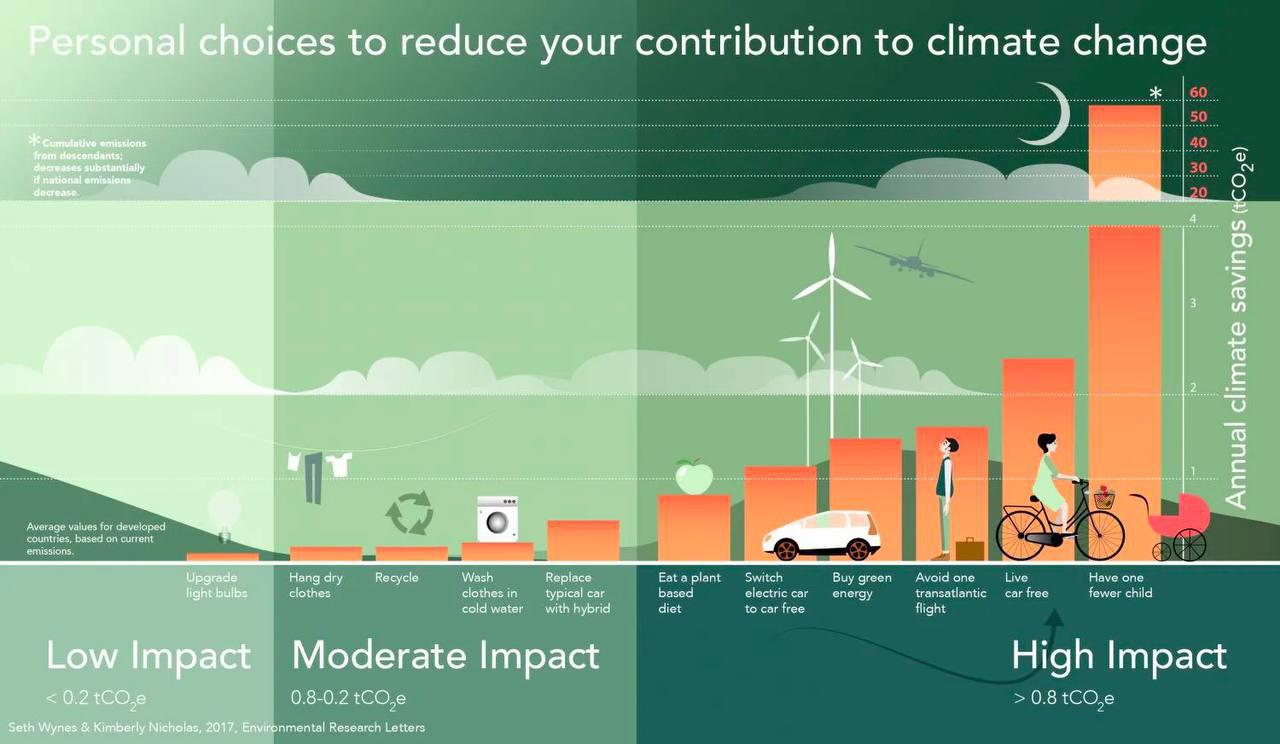Edit: I wanted to apologize after reading some of the comments. You raise some legitimate points, I realize that there is a subtle malthusian element to this chart and some of you feel like a burden already. Furthermore, you raise a good point about corporate pollution, oil companies, and how their footprint is much greater than average plebs like us.
That's 100% valid and I don't disagree with you at all. My "compromise" I guess would be that continue to apply pressure and protest against large corporations, but in terms of ourselves, just pick a few things you can cut down on yourself, it does not have to be everything on this list.
For example, I really prefer having animal products in my diet, but I am willing to live in a small apartment , car-free, and not go on vacation much in my adulthood. In the same way, you guys can pick what you are comfortable with in reducing and what you do not want to compromise on.
All of us have different standards of living and we are flexible on some things, and some things we are not flexible. That is alright, just consider changing what you are comfortable with, but please do not think you are a burden. Your presence and your life is valuable to me. I don't like to demoralize people.

I mean... I look at this chart, and I see that a single transatlantic flight has more impact than completely eliminating the use of your car?
I'm with you, but not for any semblance of the same reason :) I'm with you because im a hostler, a commercial driver that just moves cargo around a local yard. We send roughly 400 tons of bulk paper down the road and rails every 12 hour shift. Most of that is used to manufacture goods like cups, straws, and takeout boxes, within roughly 800 miles of here, but the majority of what goes on railcars is bound for Japan... it's literally going to be transported to the other side of the globe. Japan wants incredibly specific quality paper, and they get it from here. That's a huge amount of tonnage going across the Pacific, and going by this chart might be roughly equivalent to every single car driven in an entire less populous state. Just the shit I move around the yard here... And then basically everything bought in the US is made in China... all that stuff goes across the Pacific.
A long haul truck gets 6mpg, and runs 100k miles a year... every truck, every year... A whole ass lifetime worth of fuel for an average commuter in a "gas guzzling" SUV, in a year. One single truck. Every few days one of these trucks comes to your Walmart, your Home Depot, your Costco.
This chart is peanuts compared to JUST "economy of scale"... Not corporations or manufacturing, just the simple economics of shipping the spork you got at Taco Bell across the Pacific and driving it from the spork warehouse to 2,000 different taco bell joints...
Your personal carbon footprint is a fucking joke. Not in the sense that you shouldn't care, but in the sense that what we do individually, despite being incredibly laudable at its own scale, is such a tiny tiny impact at the scale of economy...
I feel you. Not the way you mean it, but I really do feel you :)
While this is true, also consider the reason those trucks are necessary. If no one took a spork from taco bell, and used dishes at home instead, that truck would never need to come. Do this with many other non-essential items, and the impact starts becoming measurable. Using electric trucks for the essentials could eliminate that pollution entirely, though that last step is policy, not individual.
Making a policy out of this introduces a choice in enforcement tho:
is it more feasible to make sure every individual brings their own flatware, or is it more feasible to make sure taco bell doesn't stock flatware?
A lot of the time, these things boil down to supply side vs demand side, and regulating the supply side ends up being the better choice.